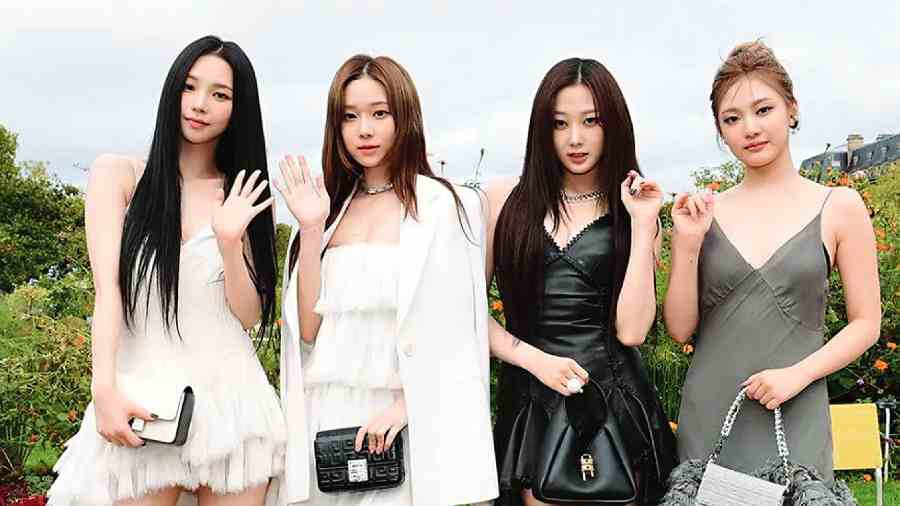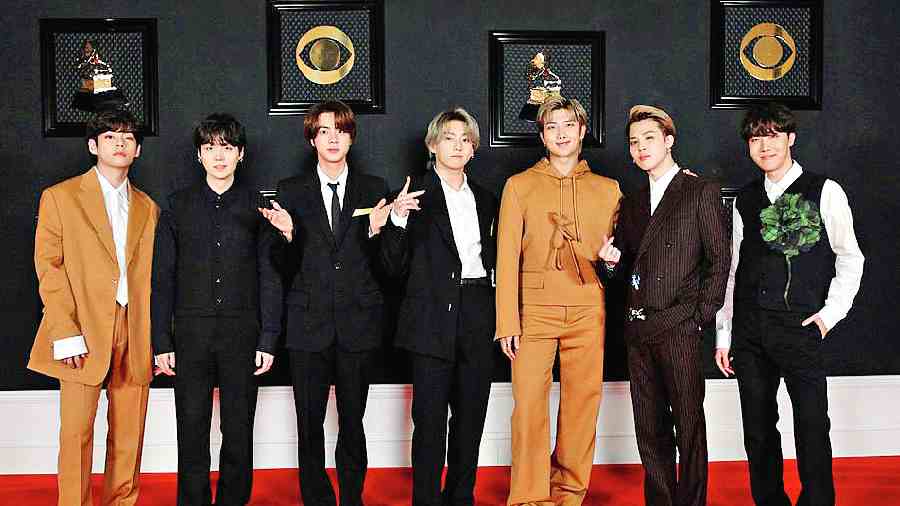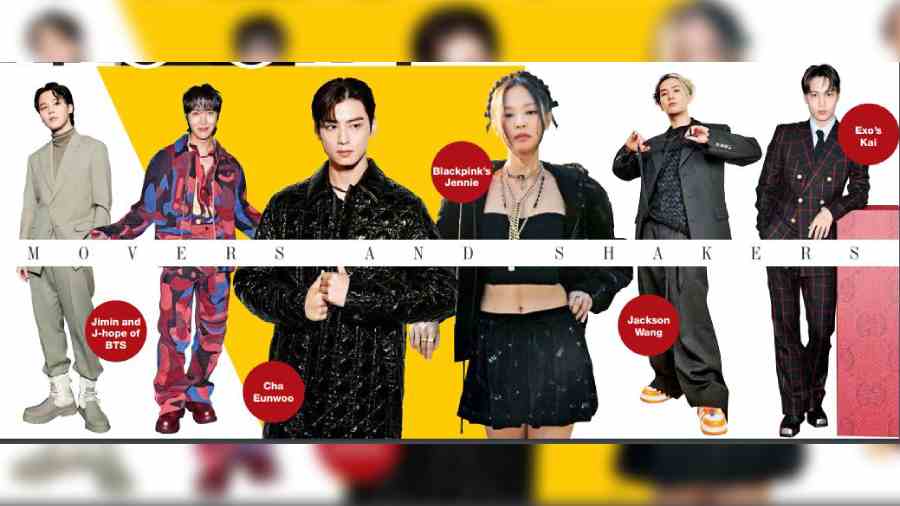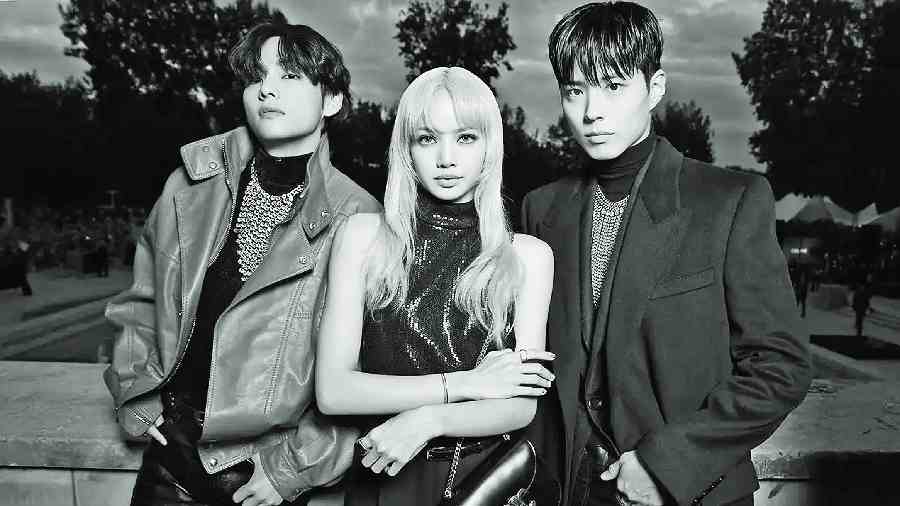At Dior’s show for Men’s Fashion Week Autumn/Winter 2023, the streets of Paris roared when K-pop star Jimin arrived. The recently appointed global ambassador of the fashion house and member of BTS, attended the show with bandmate J-hope, creating a buzz that seems unending. They were not the only
K-pop stars creating a buzz in Paris during the fashion week. A number of other K-pop stars had eyes glued to their every sartorial outing during the week. Even a few years ago, South Korean celebrities at fashion week front rows would have been an occasional and even a rare sight, but not anymore. Not just at fashion weeks, the luxury fashion brands too have started looking beyond Hollywood and roping in K-pop stars as their brand ambassadors. t2oS explores what makes K-pop stars the new global fashion icons.
Brand value

Aespa at 2022 Paris Fashion Week for Givenchy
Luxury fashion has always been known to be notoriously out of reach. Other than the obvious financial constraints, interest around high fashion has always been constricted to the upper echelons of society. There has been hardly any visibility regarding luxury product releases among the general public. However, with a large number of brand ambassadors from East and Southeast Asia, brands have been seeing increased visibility for their products.
Today, it is not an uncommon sight to see with every new product released, ambassadors of the brand posting it on their social media. Take for example, the Para Triangle Symbole bag that was released last year. With Hallyu stars posting about the bag, the product’s visibility significantly increased, given their social media reach. According to Vox, in its ‘Year in Fashion’ report, which tracked more than 100 million searches from 80 million shoppers across the globe in 2018, Lyst identified K-pop stars as “major global fashion influencers”. And over the years, this has only intensified with more and more Asian celebrities being signed on as ambassadors. Members of girl group NewJeans, who only debuted last year, are already ambassadors for major brands like Burberry. Brands are also taking social media campaigns and advertisements as a major part of any product release.
According to a recent article in Business of Fashion, the impact of these Korean stars online can even surpass the most popular Western celebrities. For example, a partnership between Kim Kardashian and Dolce & Gabbana, for which the reality TV star and mega-influencer helped “curate” and style the brand’s September 2022 show, garnered headlines and online visibility worth $4.6 million, according to Launchmetrics. On the other hand, Blackpink star Jisoo garnered buzz worth $7 million for Dior’s show in Paris the same season, mostly just by attending the shows.
The other Blackpink members — Lisa, Jennie and Rose — have also been regular at fashion show front rows. Other prominent figures from the K-pop world, seen recently at fashion weeks, include the boy band Enhyphen, IVE’s Wonyoung, Astro’s Cha Eunwoo, and Big Bang’s Taeyang. After BTS announced their break middle of last year, members have been venturing out with solo projects that seem to be including conquering the fashion world. Soon after Jimin, Suga of BTS also joined Valentino, the luxury Italian fashion house. He joins as a Di.Vas, an acronym used to refer to the brand’s ambassadors and which stands for ‘Different Values’.
K-pop’s influence on global fashion is an undeniable fact. With every social media post, event, or even outfits, K-pop stars have sent topics trending all over Twitter or even had items sold out. For a long time, pop titans BTS were coveted in the fashion industry for deals, due to their ability to sell out items they use and for not signing with any particular fashion house (till their collaboration with Louis Vuitton in 2019). For instance, last year, when member Jimin wore a striped CELINE sweater to a music show performance, it almost immediately got sold out in all sizes on the brand’s official website. With the BTS members’ history of driving up sales and their brand value, it was not surprising when Dior’s stocks went up for the first time in 31 years, following their appointment of Jimin as their new global brand ambassador. To brands, therefore, the popularity of Asian stars is now a highly influential source to tap into and to reach out to the post-pandemic global consumer base.
For fans, buying products that their favourite celebrities have used can be a way to feel a deeper connection. And for a cultural phenomenon as big and globalised as K-pop or in general the entire Hallyu wave, these fans are many in number. The Asian market for luxury goods is increasing as well, with more availability and this increased visibility. According to a recent study by Morgan Stanley, South Koreans spending on personal luxury goods grew by 24 per cent in 2022 and they are now the biggest per capita spenders on luxury goods. For brands, this evidently is a huge opportunity.
The Korean Influence

K-pop titans BTS collaborated with Louis Vuitton in 2019, which was their first global fashion tie-up
Korean fashion has had a major influence worldwide, especially through the conduit of K-pop and particularly, on men’s clothing. Featuring distinct colours, bold silhouettes and gender-neutral items, Korean fashion is much more experimental than its Western counterpart.
In Dior’s A/W 2023 collection, pleated half skirts with pants made a statement. BTS member J-hope sported it at the show as well. Speaking on the collaboration with rapper, producer and song-writer Suga, Valentino creative director Pierpaolo Piccioli said, “He perfectly embodies everything that DI.VA’s testimonials stand for — diversity, inclusivity, creativity, and passion.” Suga mentioned that the brand “has been supportive of diversity”, something he too believes in. He is at the forefront of the Maison Valentino Essentials campaign, which is dedicated to menswear from the brand. Such diversification at brands that have been mostly dominated by Western faces as well as an emphasis on more alternative representations of masculinity, are helping the movement worldwide.

Besides the economic traction that they bring in, fashion houses also state that Korean stars’ willingness to wear bolder and more experimental designs make them a good fit to endorse their products. In terms of womenswear too, with the Korean influence there has been a simultaneous rise in chic and elegant everyday wear as well as gender-neutral streetwear that is evident even off the runway. So, besides their appearances at the front rows for shows of major luxury brands, Korean celebrities have affected how fashion is perceived and is getting shaped, worldwide.
The Cultural Melting Pot
K-pop is, therefore, at the centre of a cultural melting pot that is creating a rise in representation and simultaneously, increasing public interest at all fronts, including fashion. With the popularity of
K-pop, there has been a greater focus on media from other Asian nations as well. If the crowd and hype around recent fashion week appearances is anything to go by, K-pop is in the spirit of the times and its amalgamation with fashion can only grow.
